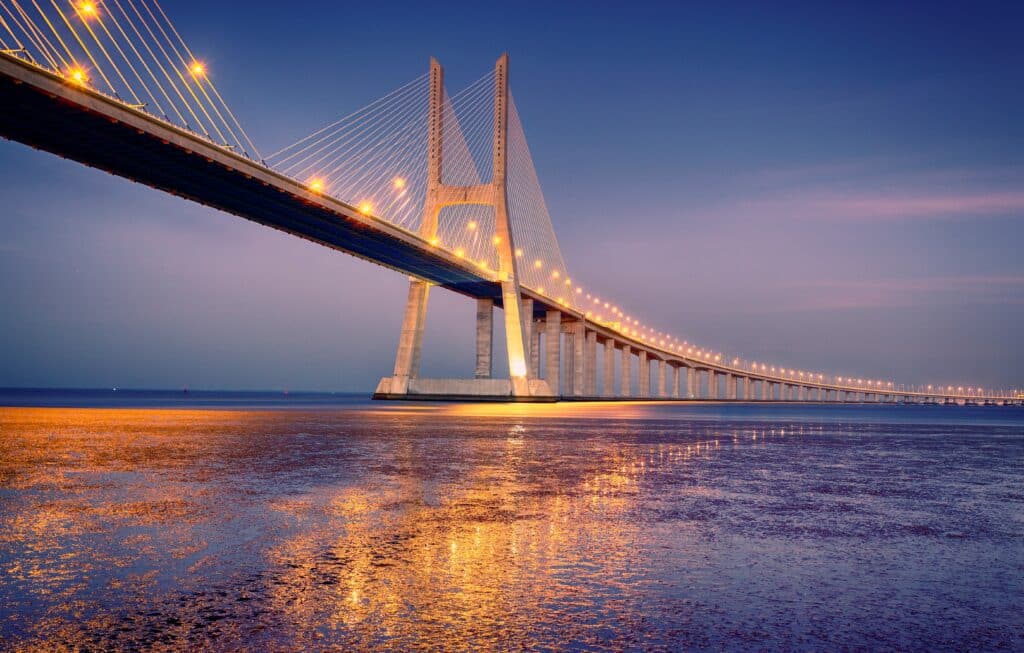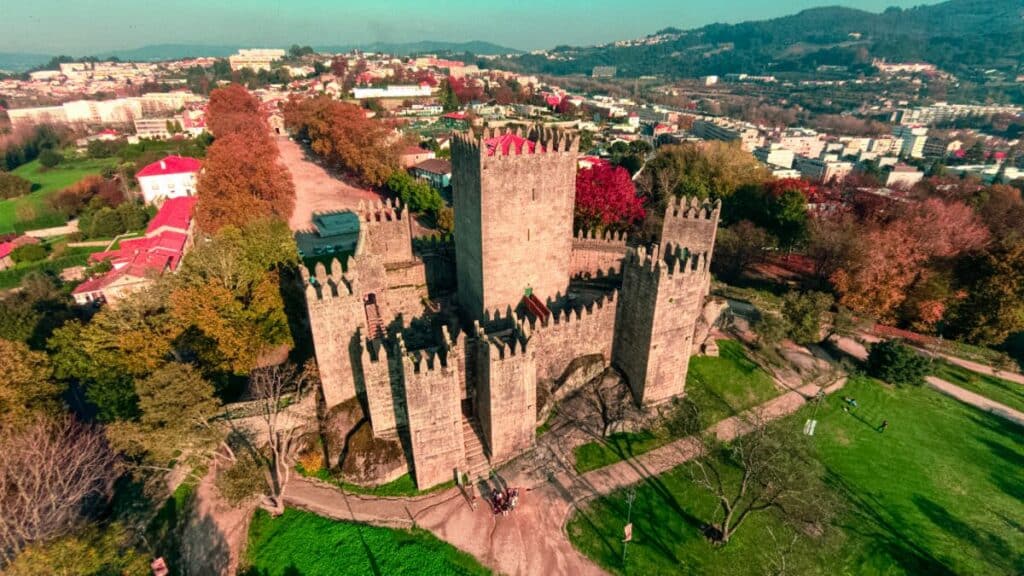Retiring in Portugal in 2022.
If you are looking to invest as an expat or high-net-worth individual, which is what I specialize in, you can email me (advice@adamfayed.com) or use WhatsApp (+44-7393-450-837).
Table of Contents
Introduction
Retiring in Portugal offers various lifestyles, with options from settling in the vibrant cities of Lisbon and Porto to neighborhoods with easy access to gorgeous beaches of the Algarve. You would love this country if you are looking for a sunny retirement location.
Who Can Retire in Portugal?
If you’re from a country that is a member of the European Union (EU) or the European Free Trade Association (EFTA), retiring in Portugal should be pretty simple. Citizens of the EU and EFTA may request a residence permit from the Portuguese Immigration Service (Servico de Estrangeiros e Fronteiras – SEF). You must do this at a regional SEF office that serves your area. Then you can take advantage of many of the same advantages as residents.
You must apply for a registration certificate if you intend to stay in Portugal for a period longer than three months. You will be eligible to apply for permanent residency after five years of residence in the country.
However, the process is a little more complicated if you are not from an EU/EFTA country. You’ll first need to apply for a residence permit at the Portuguese consulate in your home country before moving to Portugal.
If your home country is not a member of the EU or EFTA, the procedure will be more difficult for you. Prior to moving and retiring in Portugal, you must first apply for a residence permit at the Portuguese consulate in your home nation.
You need the following to qualify for a permit:
• A valid passport
• Proof of adequate income or savings to provide for yourself
• Proof of medical insurance
Do bear in mind that the specific guidelines may differ depending on where you are from so you must contact your consulate for further information. Non-EU nationals may obtain a temporary residency permit that has a validity period of five years. After that, you can then apply for permanent residency.
Retiring in Portugal: Golden Visa
For non-EU citizens seeking to get residency rights in Portugal, the golden visa program offers a quick and easy way to do so.
A waiver will be issued to those who meet the requirements, which will allow them to enter the nation and travel within the Schengen region without a visa. A one-year residence permit will be initially given, and the visa can be extended every two years thereafter. The Portuguese citizenship application can then be lodged after six years.
Golden visas are less accessible now than they formerly were, although they are largely intended to draw international investors to Portugal. One of the following is required in order to obtain a golden visa:
• Invest in property worth at least 500,000 euros ($515,355). Real estate acquisitions in Lisbon, Porto, or coastal regions like the Algarve are no longer eligible as of 2022, according to a January report by The Economic Times. Instead, investments in real estate must be made in Portugal’s interior or on the islands of the Azores and Madeira.
• Spend at least 350,000 euros on a piece of interior or island real estate in order to renovate it
• Execute a capital transfer of at least 1.5 million euros to Portugal. This was revised from an earlier value of 1 million euros.
• Commit at least 500,000 euros (up from 350,000 euros) to research projects in Portugal’s technological or scientific fields.

Retiring in Portugal: International Pension Transfer
The pension payments from any other EU nations that they have worked in, as well as those from their home country, may be transferred to Portugal by EU nationals. You can check examples of stories that illustrate how state pensions from various countries will likely be computed by authorities.
It is important to note that Portugal has tax agreements (in Portuguese) with every EU member state as well as a large number of non-EU nations in order to avoid double taxation. If you’re retiring in Portugal from a non-EU nation, nevertheless, you should confirm the regulations with the pension service in your country.
Also note that Portuguese citizens pay taxes on their worldwide income. The implication of this is that if you are retiring in Portugal, any private pensions paid from overseas may be taxed in the country. Through an offshore pension plan, it would be possible in some circumstances to transfer your private pension earnings without paying fees. The Qualifying Recognized Overseas Pension Scheme (QROPS), for instance, makes retiring in Portugal feasible for British citizens.
Applying for non-habitual residence (NHR) status in Portugal is another alternative. For a period of 10 years, this entitles foreigners to favorable tax arrangements.
Retiring in Portugal: Taxes
You are regarded as a tax resident if you remain in Portugal for more than 183 days in a tax year or if you have a permanent residence there.
The NHR status provides favorable tax conditions, such as for earnings that would otherwise be subject to retirement tax. If you meet the requirements and haven’t been a tax resident in Portugal for the previous five years, you may qualify for NHR status.
For a period of 10 years, those holding NHR status are eligible for lower taxes in Portugal. Under the plan, withdrawals and income from foreign pensions were previously tax-free. For people having NHR status, overseas pensions are now subject to a 10% tax beginning in 2020. Additionally, a flat tax rate of 20% will be applied to any income earned in Portugal from employment in certain professions, such as those in the arts, sciences, or technology. This is significantly less than regular income tax rates of up to 48%.
Retiring in Portugal: Healthcare
The healthcare system in Portugal is of high caliber so you won’t have to worry about this aspect when retiring in Portugal. On the 2021 World Index of Healthcare Innovation, the Portuguese healthcare system was ranked 17th, according to The Portugal News.
All citizens and residents of Portugal are given free medical care through the Servico Nacional de Saude (SNS), Portugal’s government-funded national health service. The SNS provides medical care to locals through community health clinics, hospitals, and regional health organizations.
If you are retiring in Portugal from another EU nation, you can use an S1 form to get free healthcare. The pension center in your home nation issues this certificate. Meanwhile, if you’re retiring in Portugal from the UK, you can check their government website to get further details about the S1 form.
Some EU residents who are retiring in Portugal purchase supplemental private health insurance. In Portugal, there are numerous social and private voluntary medical insurance programs. You can escape the lengthy waits frequently experienced in the state system with the aid of private insurance, and it could also give you additional access to other services like dentists and opticians.
Unless retirees from non-EU nations become citizens who live in Portugal permanently, they will not be eligible for free healthcare. This implies that you might be forced to get private health insurance for the first five years of your residency.
Retiring in Portugal: Best Places for Expats and Costs of Living
For expats considering a foreign retirement, housing is a major consideration. The rising cost of homes should be considered as well. The good news for those retiring in Portugal and looking to purchase a home is that they can still be found for a reasonable price compared to other European nations.
According to global cost of living data aggregator Numbeo, the price per square meter of an apartment in Portugal’s city center costs 2,946 euros, while that outside of that area costs 1,972 euros (as of the time of writing).
Here are some of the greatest places for expats to live in Portugal, whether you want to live in a bustling city or enjoy a relaxed lifestyle by the sea.
Algarve
English-speaking foreigners love living in the Algarve region. It is made up of 16 municipalities and is located on the southern coast of Portugal. It is known for its stunning beaches and clifftops as well as its great quality of life. You should definitely consider this if you’re retiring in Portugal.
A meal at an inexpensive restaurant in Algarve is estimated to cost 12 euros while a mid-range restaurant can charge 38 euros for a three-course meal for two, according to Numbeo.
Renting a one-bedroom apartment within Algarve’s city center costs 900 euros per month and about 602 euros outside that area. It’s also one of the more costly areas in Portugal to purchase a home.
Lisbon
Lisbon boasts all the amenities you could ask for in a vibrant capital city, including crowded shopping areas, a variety of local villages, and gorgeous coastal areas. Everyone can find the ideal Lisbon neighborhood for them, whether they choose the posh Principe Real or the ancient Alfama district.
Nonetheless, Lisbon’s attractiveness comes at a price since the cost of purchasing a home in the city is the highest in Portugal.
A meal at an inexpensive restaurant in Lisbon is estimated to cost 10 euros, while a three-course meal for two in a mid-range restaurant can cost 45 euros, according to Numbeo.
Rent for one-bedroom apartments inside and outside Lisbon’s city center cost 1,003 euros and 784 euros on average per month, respectively. The cost per square meter for buying an apartment within the city center is at 5,176 euros, while that outside of the area is at 2,828 euros.
The overall monthly cost of living in the city for one person can hit 593 euros on average, while it can cost about 2,087 euros for a family of four, both excluding rent. These costs might make you pause if you’re set in retiring in Portugal.

Madeira
The Portuguese island of Madeira is one of the most well-liked locations when retiring in Portugal and in fact has a sizable expat population.
Despite rising housing costs, Madeira has a reasonable cost of living.
Cascais
Cascais, which can be reached from Lisbon in just 30 minutes, is particularly well-liked by both tourists and expat retirees. One of the main draws along the Portuguese Riviera are affluent communities like Estoril and Quinta de Marinha. Clean seaside homes are located throughout the lovely marina, in particular.
A meal at an inexpensive restaurant in Cascais is estimated to cost 10 euros, while a mid-range restaurant can charge 46 euros for a three-course meal for two, according to Numbeo.
Renting a one-bedroom apartment within Cascais’ city center costs 940 euros per month and about 657 euros outside that area. The costs for buying apartment within and outside the city center can reach 5,655 euros and 3,250 euros per square meter, respectively.
The overall cost of living in Cascais for a family of four can hit an estimated average of 2,008 euros per month, while a single person can live off 569 euros a month, both excluding rent.
Guimaraes
One of the most historic places in Portugal is the city of Guimaraes, which is located in the Braga region. In fact, the UNESCO has designated the city center as a World Heritage site. The city – only 35 miles from Porto – is walkable and offers a variety of services. The Old Quarter contains palaces, castles, and stone buildings, while the main plaza is home to stores and cafes. Don’t miss checking this part if you’re retiring in Portugal.
A meal at an inexpensive restaurant in Guimaraes is estimated to cost 8 euros, while a three-course meal for two in a mid-range restaurant can cost 20 euros, according to Numbeo.
Rent for one-bedroom apartments inside and outside Guimaraes’ city center cost about 567 euros and 367 euros on average per month, respectively.

Porto
Porto is the top two largest city in Portugal with a slower pace of life, so if you’re the laid-back type you should definitely look into this part when retiring in Portugal. The city has wonderful architecture and a variety of shops. The city is walkable, but it also features a vast bus and tram network, as well as a sizable international airport. Porto has some of the greatest transportation connections in Portugal.
A meal at an inexpensive restaurant in Porto is estimated to cost 8 euros, while a mid-range restaurant can charge 35 euros for a three-course meal for two, according to Numbeo.
Renting a one-bedroom apartment within Porto’s city center costs about 712 euros per month and 555 euros outside that area. The costs for buying apartment within and outside the city center can reach about 3,414 euros and 1,935 euros per square meter, respectively.
The overall cost of living in Porto for a family of four can hit an estimated average of 2,019 euros per month, while a single person can live off 573 euros a month, both excluding rent.
Retiring in Portugal: Bottom Line
Never forget that there is no perfect place to go. Be aware of the advantages and disadvantages of different locations for residence whether or not you end up retiring in Portugal. Your level of tolerance, your basic necessities, and what you can live with and without will all play a role in how you define an “ideal life.” You should eventually take your own wants and needs into account when determining where to stay. Before making a choice, weigh the benefits and drawbacks of a potential site. Be patient.
Pained by financial indecision? Want to invest with Adam?

Adam is an internationally recognised author on financial matters, with over 760.2 million answer views on Quora.com, a widely sold book on Amazon, and a contributor on Forbes.



